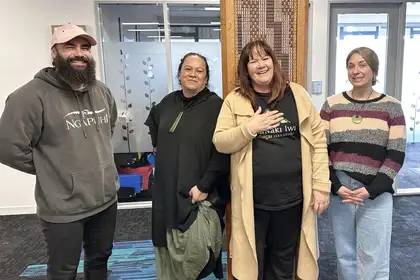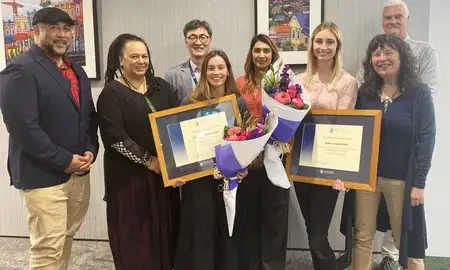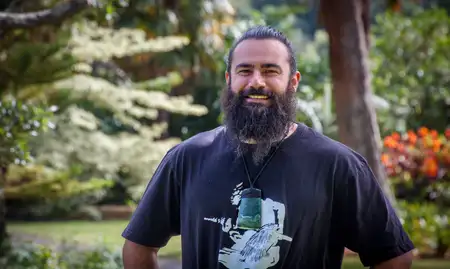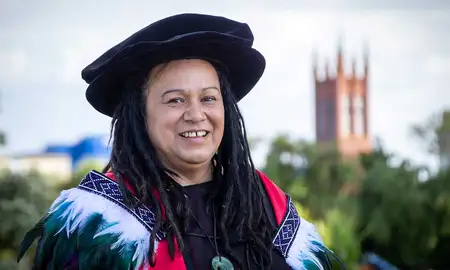
WhńĀnau PŇękenga members: Deacon Fisher, Dr Paul'e Ruwhiu, Ange Watson and Hannah Mooney.
The theme for World Social Work Day 2024 is ‚ÄėBuen Vivir: Shared Future for Transformative Change‚Äô, which focuses on the importance of social workers embracing innovative, community-driven strategies grounded in indigenous wisdom and a harmonious coexistence with nature.
Describe the team and what it does at Te Kunenga ki PŇęrehuroa ĺŇ÷›”į‘ļ
WhńĀnau PŇękenga are the tangata whenua staff within the School of Social Work at Massey who ensure the school is advocating for tangata whenua students, while also supporting the Head of School, facilitating noho marae and building te ao MńĀori capacity among our colleagues.
Who is in the team?
There are currently four members within the team. Three are completing their PhD studies, one has already completed their PhD, and one member is on six-month leave. The members of WhńĀnau PŇękenga are Ange (Andrea Makere) Watson, Te ńÄti Awa, Taranaki TŇęturu, NgńĀti Mutunga, Deacon Fisher, NgńĀpuhi, Dr Paul'e Ruwhiu, NgńĀpuhi, NgńĀti Porou and Hannah Mooney, NgńĀti Raukawa ki te tonga, Te ńÄti Awa, NgńĀ Rauru, Te ńÄti Haunui a PńĀpńĀrangi, PńĀkehńĀ.
When was WhńĀnau PŇękenga formed and how does it operate?
There has always been a space for tangata whenua staff to support each other, to be kaitiaki of our tikanga processes and ensure MńĀori content is correct and being delivered well to our students.
In 1993, a group of MńĀori academics teaching in the social work programme came together to establish what they called the ‚ÄėWhńĀnau Group‚Äô. It was a mutual support group that offered leadership and advice to the school regarding MńĀori content in the curriculum, along with other concerns and needs. The group offered support to, and focused on, the retention of tauira MńĀori. Key members of the WhńĀnau Group over time included John Bradley, Vapi Kupenga, Rachael Selby, Wheturangi Walsh-Tapiata, Dr Leland Ruwhiu, Hayley Bell, Justina Webster and Gail Bosmann-Watene.
Now known as WhńĀnau PŇękenga, the group works as a team and meet regularly with an agenda. While there is a lead person, we do not give thought to anyone being of higher status to anyone else, which fits well with our beliefs of what WhńĀnau PŇękenga is about. There is emphasis on the ‚ÄėwhńĀnau‚Äô ‚Äď our tangata Tiriti colleagues know how we work and know that everything goes back to WhńĀnau PŇękenga to discuss first.
How does the team support the integration of MńĀori perspectives and practices into social work students‚Äô education and fieldwork experiences?
We have a dedicated series of MńĀori papers throughout the Bachelor of Social Work (BSW), as well as integrating the Social Workers Registration Board Core Competence Standard 1 throughout our theoretical papers. We are fortunate to have exemplar tangata Tiriti within our fieldwork education team who work to create space for tangata whenua interests to advance.
Another aspect of both degree programmes, BSW and Master of Applied Social Work (MAppSW), is noho marae, where students get to stay on a marae and sit in the space of te ao MńĀori. We have grown the number of noho marae offered in both the third year of BSW and in MAppSW. Currently, we offer five noho marae through the year ‚Äď three in Palmerston North and two in Auckland.
We have an excellent relationship with RangitńĀne iwi and have been advocating for our students to go to Te Rangimarie marae when they first arrive to study in the area, and we are building this capacity in TńĀmaki Makaurau.
How can social work students incorporate innovative, community-led approaches grounded in MńĀori wisdom and nature, and how does WhńĀnau PŇękenga support these efforts?
At our noho marae, our students are taught about as a model and metaphor for working alongside whńĀnau. As a teaching tool, Te Paa Harakeke is grounded in te ao MńĀori wisdom and learning and comes from te taiao (the natural world). Our students often resonate with Te Paa Harakeke and often contact us when they are out in practice to inform us of how they utilise the model in their social work practice.
We also work to ensure our students are comfortable to go onto a marae, that their experiences are positive and they are experiencing a full experiential stay.
What initiatives has the team undertaken to advance MńĀori perspectives within the field of social work?
We have been involved in setting up a kaupapa MńĀori supervision policy in the School of Social Work for tauira MńĀori out in placements, alongside our field education staff. This provides additional supervision for our tauira MńĀori by tangata whenua supervisors to discuss issues pertinent to MńĀori social work practice. While it is not a requirement in social work for MńĀori social workers to attend kaupapa MńĀori supervision, there are definite advantages for kaimahi (MńĀori social workers) in having access to tangata whenua supervisors as their needs are unique.
What role do you see tikanga and mńĀtauranga MńĀori having in addressing contemporary social issues and challenges in Aotearoa?
The kŇćrero ‚Äėwhat is good for MńĀori is good for everyone‚Äô resonates with this question. We find ourselves in an ever-increasing cost of living crisis (arguably a social rebrand of poverty), our waters continue to be polluted and we are caged in an alien system of justice. As MńĀori are indigenous to Aotearoa, they hold unique relationships with the whenua in a reciprocal system of balance built over centuries. Although we can only hypothesise, it‚Äôs fair to say that the tikanga and mńĀtauranga MńĀori which guides indigenous social and environmental thought and interaction would resolve a multitude of the current contemporary social issues and challenges, if given the opportunity to flourish once again.
What does the team enjoy most about their role in WhńĀnau PŇękenga?
Ī ≤Ļ≥‹ĪŰ‚Äôe: I really love that we get to ensure that tikanga is adhered to when anyone comes into the folds of our school, whether it‚Äôs students, visitors, our Social Work Registration Board or whńĀnau and family of our colleagues. We pay attention to the finer details and we are building the capacity for our colleagues to learn as well.
Deacon: Following in the footsteps of pioneers of indigenous social work, to now belonging to WhńĀnau PŇękenga and adding to our evolving wisdom of tomorrow will always be where I find the greatest enjoyment.
Ange: I am passionate about our tauira MńĀori and that they are well supported on their journeys within this mainstream tertiary education institution and that we as MńĀori staff are aiding, supporting and helping them along their study journey. I also love supporting students‚Äô learning in the noho marae environment, which is very different to learning that takes place in a lecture room or online.
Related news
Celebrating the champions of change at the 2023 Social Work Awards
The School of Social Work recently celebrated their top students, who were commended for their academic and practical excellence alongside their ongoing commitment to the field.

Opinion: Respecting diversity through joint social action
By Deacon Fisher, NgńĀpuhi.

Call for social work to be 'decolonised'
A ĺŇ÷›”į‘ļ researcher is calling for social work education in Aotearoa New Zealand to be decolonised. Social work lecturer Dr Paul√® Ruwhiu, NgńĀ NgńĀti Porou, has just completed her PhD research into the process of decolonisation and the experiences of MńĀori social workers and MńĀori social work students.
